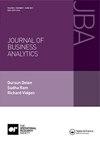A trans-national comparison of stock market movements and related social media chatter during the COVID-19 pandemic
IF 1.6
Q3 COMPUTER SCIENCE, INFORMATION SYSTEMS
引用次数: 0
Abstract
ABSTRACT The outbreak of the SARS-CoV-2 (COVID-19) pandemic first identified in 2019 has had long-term ramifications across global financial markets. We have seen stock markets across countries falling to historical lows and then recovering back during the pandemic. Prior research has established that human emotions can significantly influence financial markets. In particular, social media discussions or online Word-of-mouth (OWoM) minutely reflect public emotions and opinions associated with global market volatility. In this study, we use a quantitative approach to explore the relationship between discussions in twitter, a popular micro-blogging online platform and stock market performance across different countries, in order to understand the disaster-triggered behavioural responses of common investors across the globe. We analyse the association of national stock-indices, sentiment polarity and discussion subjectivity in Covid-19-related tweets originating in India, US, Italy, UK, Australia, Nigeria and South Africa during February 2020– January 2021 period. Using a combination of multiple analytics methods, our study examines: (i) linear and lagged association between OWoM and market performance; and (ii) heterogeneity in the OWoM-market relationship across the seven countries. Our results show weak but statistically significant correlation between OWoM subjectivity and polarity and stock market returns across countries. Our findings also show differential temporal association of OWoM and market returns across countries. Our study shows stock market connectedness between pairs of countries, some simultaneously varying while others varying with a time lag, and the strength of such connectedness increases during global disasters such as the COVID-19 pandemic.COVID-19大流行期间股市走势和相关社交媒体讨论的跨国比较
2019年首次发现的SARS-CoV-2 (COVID-19)大流行的爆发对全球金融市场产生了长期影响。我们看到各国股市跌至历史低点,然后在疫情期间回升。先前的研究已经确定,人类的情绪可以显著影响金融市场。特别是,社交媒体讨论或在线口碑(OWoM)详细反映了与全球市场波动相关的公众情绪和意见。在这项研究中,我们使用定量方法来探索twitter(一个流行的微博在线平台)上的讨论与不同国家股市表现之间的关系,以了解全球普通投资者的灾难触发行为反应。我们分析了2020年2月至2021年1月期间来自印度、美国、意大利、英国、澳大利亚、尼日利亚和南非的covid -19相关推文中国家股指、情绪极性和讨论主观性的关联。通过多种分析方法的结合,我们的研究检验了:(i) OWoM与市场绩效之间的线性和滞后关联;(二)7个国家间oom与市场关系的异质性。我们的研究结果显示OWoM主观性和极性与各国股市收益之间的相关性较弱,但具有统计学意义。我们的研究结果还显示了不同国家的自有资本和市场回报的不同时间关联。我们的研究表明,国家对之间的股市连通性,有些国家同时变化,有些国家则随时间滞后而变化,在2019冠状病毒病大流行等全球灾难期间,这种连通性的强度会增强。
本文章由计算机程序翻译,如有差异,请以英文原文为准。
求助全文
约1分钟内获得全文
求助全文
来源期刊

Journal of Business Analytics
Business, Management and Accounting-Management Information Systems
CiteScore
2.50
自引率
0.00%
发文量
13
 求助内容:
求助内容: 应助结果提醒方式:
应助结果提醒方式:


